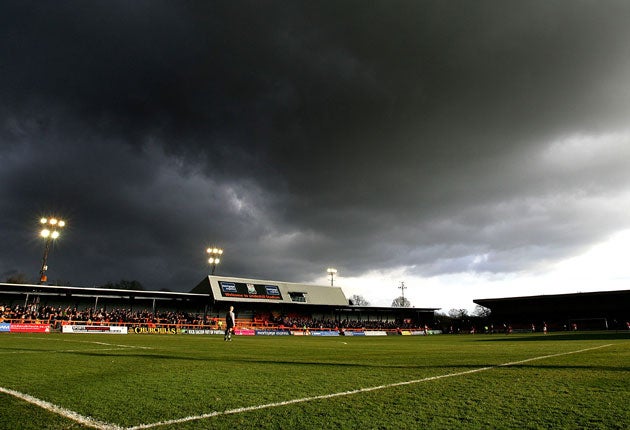Bees seek the land of milk and honey
Barnet are desperate to leave Underhill far behind but poor attendances will not help to lift them off rock bottom

Following Barnet has never been as much fun as in their earliest days as a Football League club, but then how could it be? In the first month of the 1991-92 season they lost the opening game at home to Crewe 7-4, drew 5-5 at Brentford and won 6-0 at Lincoln. All that and Stan Flashman, the country's most famous ticket tout, as chairman. No wonder Barry Fry, the ebullient manager at the time, prone to dashing down the touchline at every goal scored, had heart trouble.
The colourful combination of Flashman, Fry and frequent other F-words is long gone, replaced by Tony Kleanthous, a member of the Football Association Council and International Committee, and Mark Stimson, the former Gillingham manager. Yet two basic problems remain from 20 years ago: the Underhill ground, with its sloping pitch and tiny stands hemmed in among residential streets, is inadequate; and too few people watch games there. Yesterday for the 3-1 victory over Cheltenham Town, the attendance was just 2,082, a figure not helped by having started the day as bottom team in the whole Football League.
Having already gone back down to the Conference once, in 2001, the Bees are keen not be stung again, yet like all clubs at that level they have to fight against the vicious circle of weakening the team by selling their best players out of financial necessity. The solution has been to build from the bottom up, investing in the future with the Hive training centre (Bees, Hive, geddit?), an impressive facility that Fabio Capello opened last December and Bulgaria used before playing at Wembley on Friday.
Planning permission has just been received to upgrade the 3,000-capacity stadium there into one of Football League standard, although it remains the fall-back option rather than the desired one.
Ideally the club would prefer to stay in the borough of Barnet – the Hive is half a mile outside, in Edgware – but they have been searching locally ever since Kleanthous took over.
"I've always said since I came to the club 16 years ago that Barnet Football Club should be in the London Borough of Barnet and I'm trying to get Barnet Borough Council to understand that," Kleanthous said from Portugal, where he was accompanying the England Under-21 squad before rushing back for yesterday's game. "In four years' time, I'll have been there 20 years and there comes a point where you say 'enough'. If the borough can't find a solution, there has to come a point where you draw the line.
"We could probably get away with our ground in League One but there's no way it would be manageable to go up another level," he added. "We've always had this artificial ceiling. It's really frustrating."
It is an ambitious way to think for a club that, like Dagenham & Redbridge, always seemed likely to struggle for support at League level because of such close proximity to a dozen or more London clubs. Links with the bigger ones can sometimes be useful and they helped in the past with recruiting players – Jimmy Greaves, Bob McNab and Tony Cottee among them – and managers including Alan Mullery, Ray Clemence and Peter Shreeves. In general, however, it is the managers with a lesser profile who have done best, and Stimson, who was appointed in June to a team that finished 21st in League Two last season, has to hope that continues.
Arsenal still visit annually for a pre-season friendly and until this season played all their reserve games at Underhill. In common with other top flight clubs, however, they are now switching many of them to their training ground, where no spectators will be allowed to watch. It is an example of what Kleanthous believes strongly to be the Premier League's uncaring attitude to their smaller brethren.
"What do they achieve by that? A lot of smaller clubs were hosting those games. What the Premier League are doing is terrible. Everything they do is about their own growth, they don't mind if it's detrimental to every other club in football. They just don't understand that what they do is having such an effect. The Premier League control everything in this country, not the FA or the Football League, and there's nothing you can do.
"There's more income than we've ever enjoyed, huge amounts come into the game. You'd have thought clubs would have great facilities, prices would be kept low, but we can't get any changes through. And when you speak out against them you get a really hard time."
His willingness to do so endears him to Barnet followers who, apart from an occasional gripe about admission prices or the sale of another striker, appear to be broadly supportive of their chairman. He, in turn, was upset to be asked at a recent supporters' forum if things had improved since he took over, and Kleanthous felt obliged to point out the progress made off the field, if not on it.
"I took over a club nearly £2m in debt, a squad with an average age of 31, no youth set-up, a dilapidated stadium, no assets, no facilities and average support of 1,500," he said. "We didn't meet Conference ground criteria, let alone Football League, and we trained in a park. Yet we endure, thrive and prosper."
In the circumstances, endurance on its own is something to be proud of. Thriving and prospering are a bonus.
Join our commenting forum
Join thought-provoking conversations, follow other Independent readers and see their replies
Comments